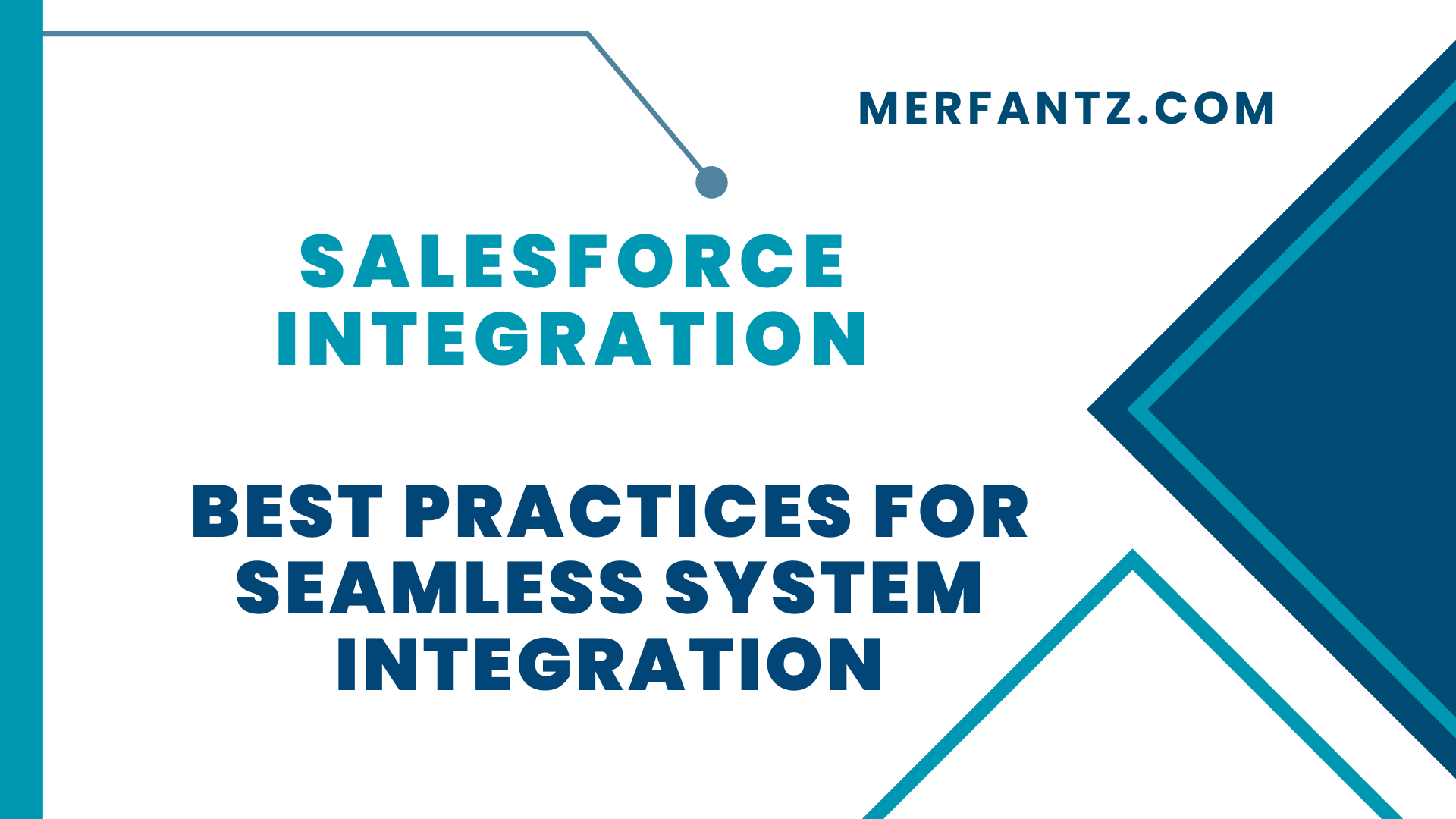Understanding Salesforce System Integration
Salesforce system integration is the process of connecting and synchronizing various business systems with the Salesforce platform. It allows organizations to streamline their operations, enhance data accuracy, and improve overall efficiency. By integrating Salesforce with other systems such as CRM, ERP, marketing automation, and customer support software, businesses can achieve a unified view of their data and enable seamless information flow across departments.
At Merfantz Technologies, we understand the significance of Salesforce system integration in modern businesses. Our expert team possesses in-depth knowledge of the integration process and can help you leverage the full potential of Salesforce. Whether you need to integrate Salesforce with existing systems or implement new integrations, we follow industry best practices to ensure smooth integration, minimize disruptions, and optimize your business processes.
Benefits of Salesforce System Integration
Salesforce system integration offers numerous benefits to organizations seeking to streamline their operations and enhance productivity. Firstly, it eliminates the need for manual data entry and reduces the chances of errors and data duplication. By integrating systems, businesses can achieve real-time data synchronization, enabling them to make informed decisions based on up-to-date information.
Moreover, Salesforce system integration enables a comprehensive view of customer data, allowing businesses to deliver personalized experiences, targeted marketing campaigns, and efficient customer support. By breaking down data silos and fostering collaboration, organizations can improve internal communication and ensure consistency across departments, ultimately leading to enhanced customer satisfaction and loyalty.
Key Considerations for Successful Integration
Successful Salesforce system integration requires careful planning and consideration of various factors. One crucial aspect is identifying the specific integration needs and objectives of your organization. Understanding the desired outcomes and mapping the data flow between systems is essential for a seamless integration process.
Additionally, selecting the right integration method and tools is crucial. Whether it’s point-to-point integration, middleware, or API-based integration, each approach has its pros and cons. Our experts at Merfantz Technologies can assess your requirements and recommend the most suitable integration approach that aligns with your business goals and future scalability.
Popular Salesforce Integration Methods
Salesforce offers a range of integration methods to cater to diverse business needs. One common approach is using pre-built connectors or integration apps available on the Salesforce AppExchange. These connectors provide out-of-the-box integration capabilities with popular third-party systems, simplifying the integration process and reducing development efforts.
Another popular method is leveraging Salesforce APIs (Application Programming Interfaces) for custom integration. APIs enable seamless communication and data exchange between Salesforce and external systems, offering flexibility and customization options to meet unique business requirements. Our skilled developers at Merfantz Technologies can design and implement custom API-based integrations tailored to your specific needs.
Step-by-Step Guide to Salesforce Integration
Implementing Salesforce integration involves a systematic approach to ensure a successful outcome. The first step is to conduct a thorough analysis of your existing systems and data requirements. Identify the data elements that need to be integrated and define the desired data flow between systems.
Next, select the appropriate integration method based on your analysis. Whether you choose a pre-built connector or opt for custom development using APIs, ensure that it aligns with your integration goals and business objectives. Develop a detailed integration plan that outlines the tasks, timelines, and resources required for each step of the integration process.
Common Challenges in System Integration
While Salesforce system integration offers numerous benefits, it also presents certain challenges that organizations should be aware of. One common challenge is data mapping and transformation, as different systems may store and structure data differently. It requires careful mapping and data cleansing to ensure accurate and consistent information across systems.
Another challenge is maintaining data integrity during the integration process. It’s crucial to establish proper data validation and error handling mechanisms to prevent data loss or corruption. Additionally, managing system dependencies, ensuring compatibility, and handling potential system downtime during integration are factors that need to be addressed proactively.
Security Measures for Salesforce Integration
Security is of utmost importance when integrating Salesforce with other systems. It’s essential to implement robust security measures to protect sensitive data and ensure compliance with data privacy regulations. This includes implementing role-based access controls, encryption mechanisms, and regular security audits to identify and mitigate potential vulnerabilities.
At Merfantz Technologies, we prioritize data security in every integration project we undertake. Our team follows industry best practices to safeguard your data during integration and ensures that all integration points are secured using appropriate authentication mechanisms. Trust us to provide a secure and reliable Salesforce integration solution for your business.
Best Practices for Seamless Data Migration
Data migration is a critical aspect of Salesforce system integration. To ensure a seamless transition, it’s essential to follow best practices for data migration. This includes performing a thorough data cleanup, deduplication, and validation to eliminate inconsistencies and inaccuracies in the data before migration.
Furthermore, it’s crucial to define data migration strategies, such as choosing the appropriate data extraction and transformation methods. Incremental data migration can be employed to minimize downtime and ensure continuous data availability during the migration process. Regular data validation and testing should be conducted to verify the accuracy and completeness of migrated data.
Customizing Salesforce Integration Solutions
Customizing Salesforce integration solutions is crucial for businesses aiming to align their systems and processes with specific requirements. By tailoring integration solutions to their unique needs, organizations can optimize data flow, enhance efficiency, and improve overall productivity. Customization allows businesses to leverage the full potential of Salesforce integration by incorporating specific data mappings, workflow automations, and personalized user interfaces. Whether it’s designing custom APIs, implementing specialized connectors, or developing tailored data transformation processes, customization ensures that Salesforce integration seamlessly integrates with existing systems and aligns with the business objectives.
At Merfantz Technologies, we understand the significance of customization in Salesforce integration projects. Our team of experienced developers and consultants collaborates closely with clients to identify their specific integration requirements. We employ a strategic approach to analyze existing systems, map data flows, and define integration goals. Leveraging our expertise in Salesforce development and integration, we deliver customized solutions that not only streamline processes but also enable businesses to extract maximum value from their Salesforce ecosystem. With our tailored Salesforce integration solutions, businesses can achieve seamless data exchange, efficient workflows, and enhanced system performance.
Achieving Business Growth with Salesforce System Integration
Salesforce system integration plays a pivotal role in driving business growth. By connecting and aligning various systems, organizations can leverage the power of data and gain valuable insights. This enables informed decision-making, targeted marketing campaigns, and improved customer experiences, ultimately leading to increased sales, customer retention, and business growth.
At Merfantz Technologies, we believe in the transformative potential of Salesforce system integration. Our team of experts combines technical prowess with business acumen to deliver integration solutions that propel your organization towards sustainable growth. Partner with us to unlock the full potential of your Salesforce system integration and drive success in your business endeavors.
FAQ (Frequently Asked Questions) – Salesforce Integration
What is Salesforce system integration?
Salesforce system integration refers to the process of connecting and synchronizing Salesforce with other business systems, such as CRM, ERP, marketing automation, and customer support software. It enables seamless data exchange, real-time synchronization, and a unified view of information across systems.
What are the benefits of Salesforce system integration?
Salesforce system integration offers several benefits, including streamlined operations, improved data accuracy, enhanced decision-making through real-time insights, personalized customer experiences, efficient collaboration across departments, and increased productivity. It eliminates data silos, reduces manual effort, and enables businesses to leverage the full potential of their systems.
What are the key considerations for successful Salesforce integration?
Successful Salesforce integration requires careful planning and consideration of various factors. Key considerations include identifying integration objectives, mapping data flow, selecting the appropriate integration method (such as pre-built connectors or custom API-based integration), ensuring compatibility, addressing security concerns, and managing potential system downtime during the integration process.
What are some popular Salesforce integration methods?
Salesforce offers a range of integration methods, including pre-built connectors available on the Salesforce AppExchange and custom API-based integration. Pre-built connectors provide out-of-the-box integration capabilities with popular third-party systems, while API-based integration offers flexibility and customization options to meet unique business requirements.
What are the methods of integration in Salesforce?
The methods of integration in Salesforce include pre-built connectors, custom API-based integration, middleware platforms, and data loaders.
What are the best practices of integration procedures?
Best practices for integration procedures in Salesforce include thorough planning, clear data mapping, proper error handling, data validation, secure authentication mechanisms, and regular testing and validation.
What is the most common integration with Salesforce?
The most common integration with Salesforce is integrating CRM (Customer Relationship Management) systems, such as integrating Salesforce with other CRM platforms like Microsoft Dynamics, SAP, or Oracle CRM.
What options are available in Salesforce for integration with external services and system components?
Salesforce offers various options for integration with external services and system components, including Salesforce Connect, REST and SOAP APIs, Platform Events, Heroku Connect, and AppExchange integrations with third-party applications.
Conclusion:
Salesforce system integration is a strategic investment that empowers organizations to optimize their operations, enhance productivity, and drive business growth. By understanding the nuances of Salesforce integration methods and following best practices, businesses can achieve seamless data flow, improved collaboration, and enhanced customer experiences. At Merfantz Technologies, we specialize in Salesforce integration solutions, leveraging our expertise to deliver customized, secure, and efficient integrations tailored to your unique business needs. Contact us today to embark on your Salesforce integration journey and unlock the full potential of your systems.
Author Bio
Co-Founder & CMO at Merfantz Technologies Pvt Ltd | Marketing Manager for FieldAx Field Service Software | Salesforce All-Star Ranger and Community Contributor | Salesforce Content Creation for Knowledge Sharing






